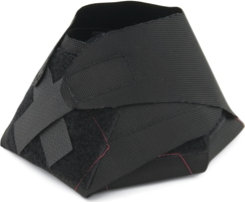A regular vaccinations schedule should be a part of any health care plan for all horses. In fact, many commercial and private stables or boarding facilities require vaccinations on a common schedule.
When I ran a private horse facility, governed by rules including general health management rules and a vaccinations schedule, one of the harder things to do was to have horse owners keep their horses up to date on vaccinations.
The most common vaccinations for horses include:
Rabies. This is an annual vaccine, however I think some Vets will tell you that your horse will be fairly well protected getting this vaccine every two years. In my experience one out of every 20 horses has some sort of reaction to this vaccine which contains a killed virus in order for the horse to develop anti-bodies to this disease with is transmitted through a bite from an infected animal. This disease can be transmissible from horse to human. Check with your Vet to see if a rabies vaccine is indicated for your area.
Tetanus. This vaccine is given initially followed by a booster shot four to six weeks apart, then yearly after that. If you skip an annual vaccination then your Vet will probably have you go back to the initial shot followed by a booster. Tetanus is a bacteria that can enter a wound. You may remember stepping on rusty nail as a child with your Mom having a cow until she was able to get to the doctor for a tetanus booster.
Eastern and western encephalomyelitis. This disease is a virus transmitted by the mosquito. Some people think this disease is transmitted by birds,.......I just think they mistook Montana mosquitos for small birds. This vaccine is much like Tetanus where an initial vaccination is given followed by a second dose in two to three weeks or four to six weeks, depending on manufacture of vaccine used. A yearly vaccination is given after that. It is common for the Tetanus and Encephalomyelitis vaccines to be combined, sometimes with a vaccination for the Venezuelan strain of the Encephalomyelitis and called VEWT.
Rhinopneumonitis (Rhino). This is a viral disease that causes respiratory problems in horses. This is an annual vaccination but some Vets suggest a yearly vaccination in the spring with a booster in the fall. There are actually two forms of this disease. Consult your Vet to determine which version(s) your horse needs to be vaccinated against.
Influenza (Flu). This is a highly contagious viral disease that affects the upper respiratory tract of the horse. An initial vaccination is given with a 2nd shot three to four weeks later. Much like Rhino most Vets will recommend two vaccinations a year and sometimes three vaccinations depending upon if the horses travels a lot like a racehorse or show horse. It is common for the Rino and Flu vaccine to be combined.
West Nile Virus (WNV). This is a mosquito borne disease that affects the brain and spine through swelling. It has rapidly spread across the country since it was detected 10 or 11 years ago. I have read statistics that say one in every three effected horses will die. I have only seen one infected horse, and he made it, but it looked to be touch and go for awhile. Now this horse is roped off of and doing well. Lack of motor control, stumbling, loss of appetite and lethargy are all signs of this disease. Much like other vaccinations there are two shots in the initial series followed by one annual vaccination, although some Vets will suggest two shots, each one about 4 to 6 weeks before the onslaught of a rainy season and therefore mosquito season. I am lucky to live in an area devoid of a large number of mosquito so I vaccinate once a year, in April before the June rains.
Pneumabort K-1B is a vaccination for pregnant mares, given the 5th, 7th and 9th month of a pregnancy to prevent against abortion.
Strangles. This is a bacterial disease that is contagious and affects the horses respiratory tract with symptoms that include abscesses that appear along the lower jaw. Sometimes a tooth problem may appear (misdiagnosed) to be strangles. I have seen stables quarantined by the USDA for a positive strangles case. This vaccination requires three initial shots, followed by a yearly vaccination.
Potomac Horse Fever is a disease usually seen in the summer months which can cause high fever and diarrhea among other things with a chance of the horse also foundering. This disease has a high mortality rate. A annual vaccine is now available, however requiring an initial shot and booster in 3 or 4 weeks, then an annual vaccination.
The horse owner should consult with his/her Veterinarian to determine which vaccinations are appropriate to the area. There are many combinations of vaccinations and some Vets will let you give your own vaccinations thereby lowering your cost, except for rabies which is normally required by the state to be given by a licensed Vet. The risk is too great for your horses not to have them on a routine vaccinations schedule.


















No comments:
Post a Comment